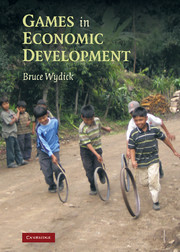Book contents
- Frontmatter
- Contents
- List of Figures and Tables
- Preface
- 1 Economic Development, Interdependence, and Incentives
- 2 Games
- 3 Development Traps and Coordination Games
- 4 Rural Poverty, Development, and the Environment
- 5 Risk, Solidarity Networks, and Reciprocity
- 6 Understanding Agrarian Institutions
- 7 Savings, Credit, and Microfinance
- 8 Social Learning and Technology Adoption
- 9 Property Rights, Governance, and Corruption
- 10 Conflict, Violence, and Development
- 11 Social Capital
- 12 The Political Economy of Trade and Development
- Appendix
- Exercises for Interested Readers
- References
- Index
2 - Games
Published online by Cambridge University Press: 05 September 2012
- Frontmatter
- Contents
- List of Figures and Tables
- Preface
- 1 Economic Development, Interdependence, and Incentives
- 2 Games
- 3 Development Traps and Coordination Games
- 4 Rural Poverty, Development, and the Environment
- 5 Risk, Solidarity Networks, and Reciprocity
- 6 Understanding Agrarian Institutions
- 7 Savings, Credit, and Microfinance
- 8 Social Learning and Technology Adoption
- 9 Property Rights, Governance, and Corruption
- 10 Conflict, Violence, and Development
- 11 Social Capital
- 12 The Political Economy of Trade and Development
- Appendix
- Exercises for Interested Readers
- References
- Index
Summary
No man is an island …
– John Donne, Meditation XVIIADAM SMITH'S CONCEPTION of the “invisible hand” postulated that a market consisting of self-interested individuals would yield an outcome that was best for society simply through the natural course of free exchange. One of the most striking contributions of game theory has been to demonstrate that the benevolence of the “invisible hand” is merely a special case, rather than a general truth about the fruits of economic self-interest. We will observe a number of cases, in fact, where the invisible hand can become an angry, malevolent hand, punishing players for their selfish behavior. What we will see is that self-interest is sometimes good for society, but often it is not. Indeed, self-interest may yield very poor economic outcomes outside the discipline of well-functioning institutions.
Game Theory
The origins of game theory are fascinating, and they help us to understand how such important insights came about. The work of French economist Augustin Cournot revealed the earliest glimpses of a formalization of strategic behavior in the 1830s. Cournot developed a famous model of strategic competition between two firms that foreshadowed some of the later insights of game theory. But Cournot was never able to generalize his concept of an equilibrium solution to other contexts, and for many decades, his results were regarded as insightful as applied to only a restricted type of competition between two firms.
- Type
- Chapter
- Information
- Games in Economic Development , pp. 17 - 32Publisher: Cambridge University PressPrint publication year: 2007



